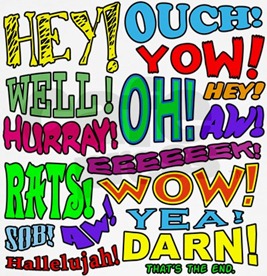

To express congratulations - Cheers, congratulations.To express displeasure - Boo, ew, yuck, ugh, shoot, whoops, rats.An interjection is usually just a single word – and unlike any other part of English grammar, it doesn’t influence the grammar of a sentence in any way. Interjections are words that you can use to express a strong sense of emotion or feeling. They do not have to have a relation to the other parts of the sentence. They usually cannot be modified or inflected. Interjections are unique and have some interesting features: Interjections don’t have a grammatical function in the sentence construction. You can use interjections at any time, to add an extra touch of meaning.ĭo you believe that every interjection is unique Why or why not? … What have you learned about interjection? Interjections such as “uh”, “you know”, and “like” are used to allow the speaker’s mouth to catch up with his or her brain, or to make sure the listener has a chance to at least try to attempt to get the meaning of what is being said. How the use of interjections affect your manner of communication? Instead, interjections simply convey the way the author (or speaker) is feeling. They do not relate grammatically to the other parts of the sentence, nor do they help the reader understand the relationship between words and phrases in the sentence. They express meaning or feeling in a word or two. What is the importance of interjection in speech delivery? They can express a wide variety of emotions such as: excitement, joy, surprise, or disgust. Basically, the function of interjections is to express emotions or sudden bursts of feelings. The interjection is a part of speech which is more commonly used in informal language than in formal writing or speech. In writing, interjections are used to make expressive sentences without the need for more descriptive words. We use interjections when we want to convey a strong emotion such as anger, disgust, denial, enthusiasm, frustration, happiness, or sorrow. What is the importance of interjection in our daily life? 11 Are there any negative effects of introjection in therapy?.10 Which is an example of a mild interjection?.9 When do you use an interjection in a sentence?.

8 What is interjection in part of speech?.4 What have you learned about interjection?.3 How the use of interjections affect your manner of communication?.1 What is the importance of interjection in our daily life?.


 0 kommentar(er)
0 kommentar(er)
